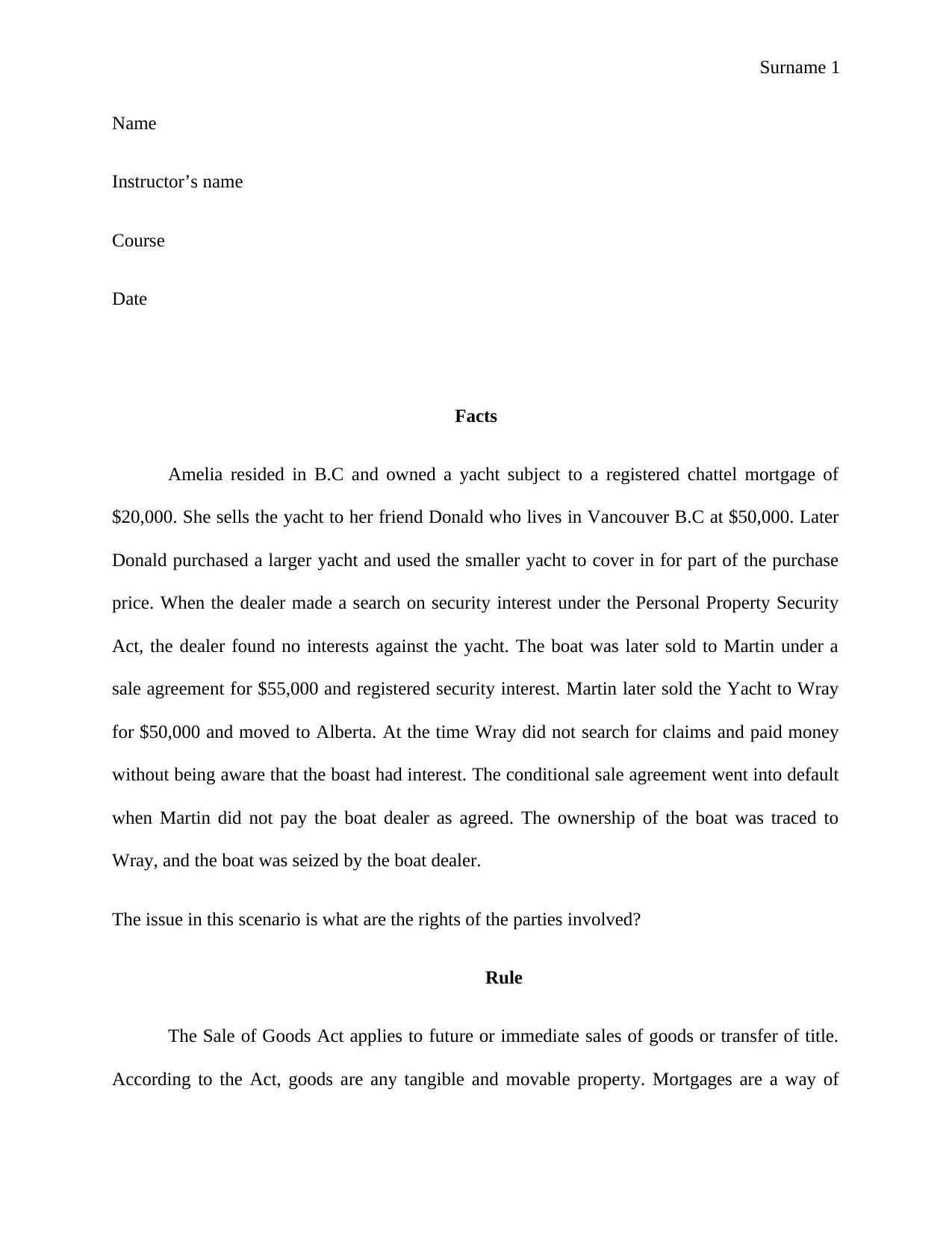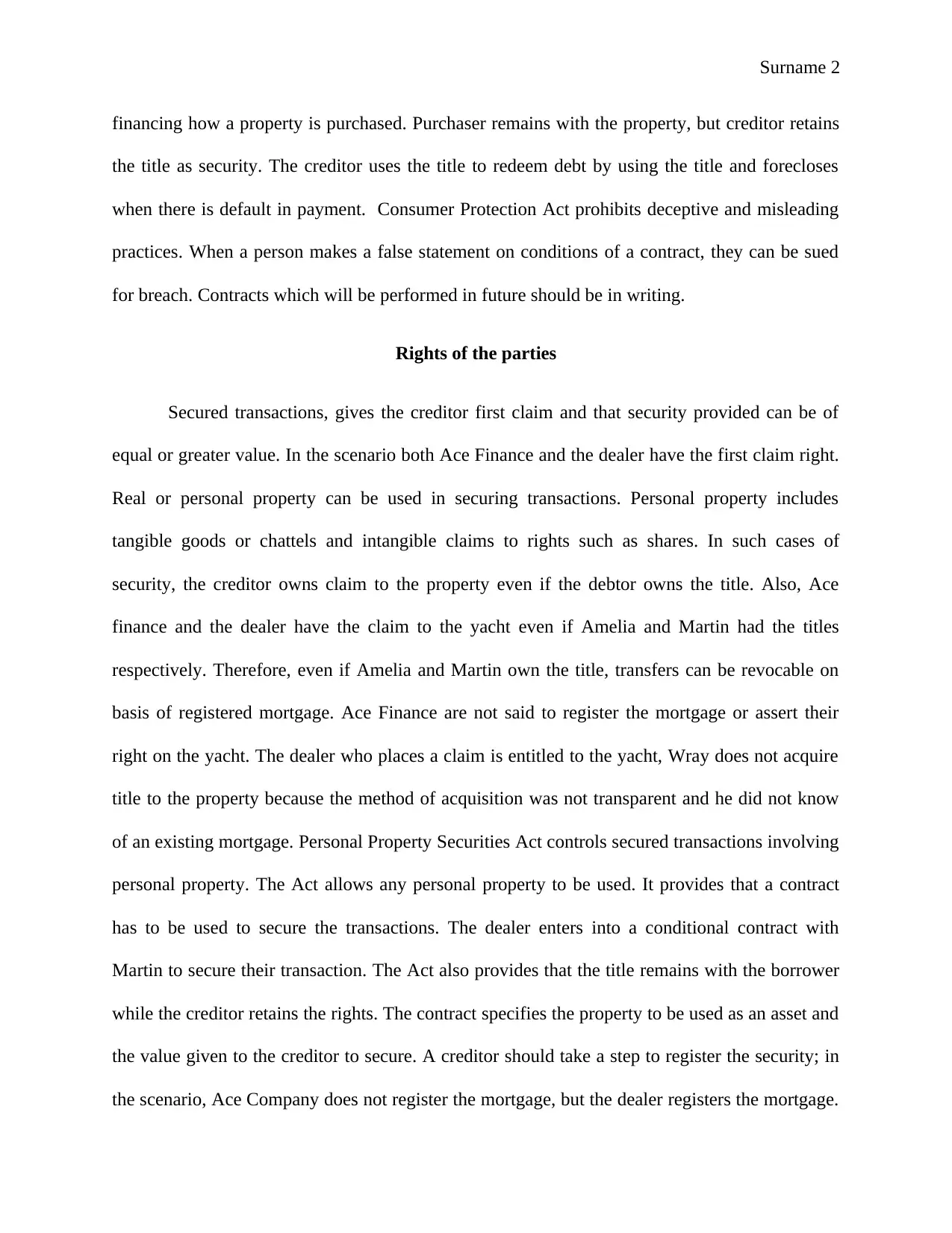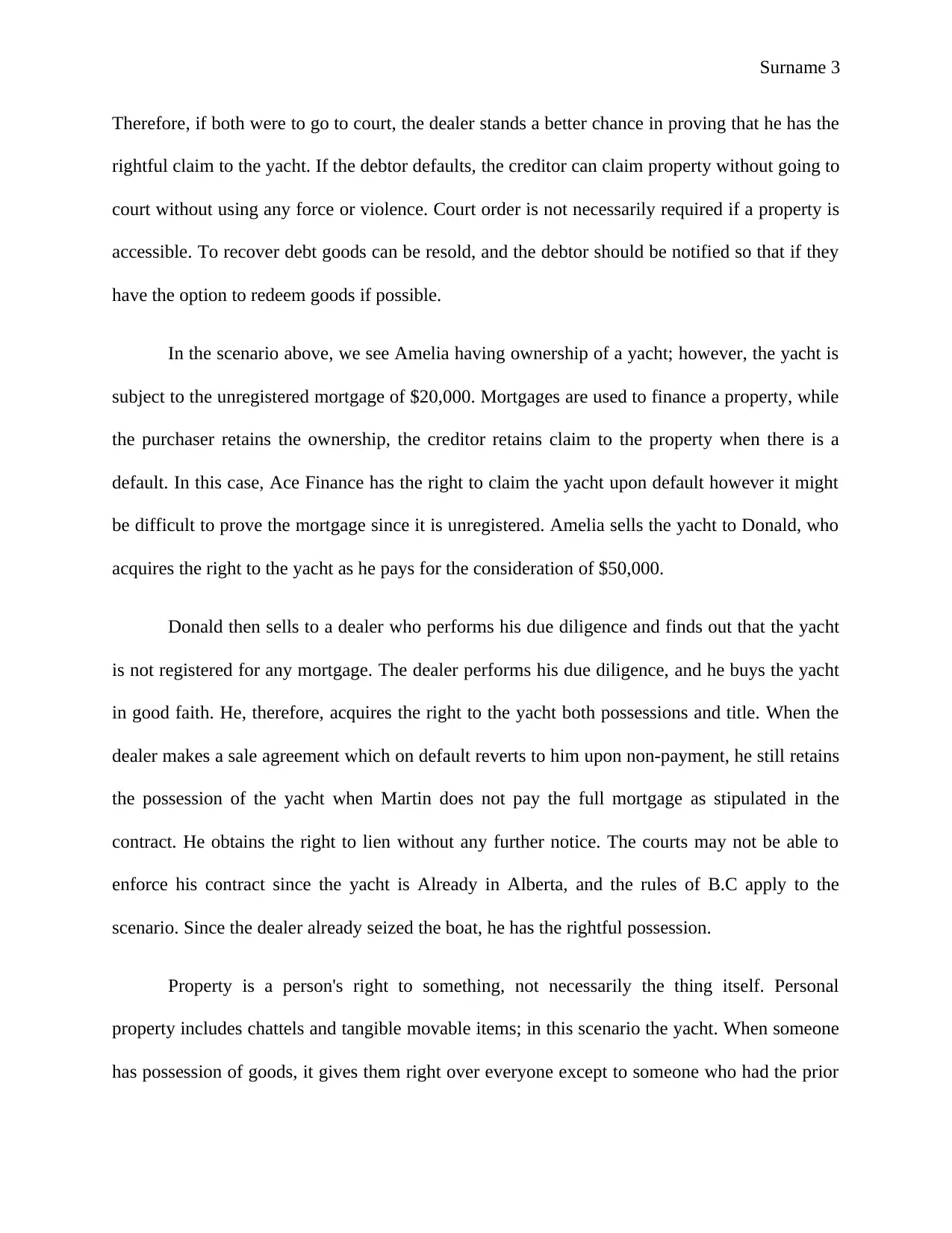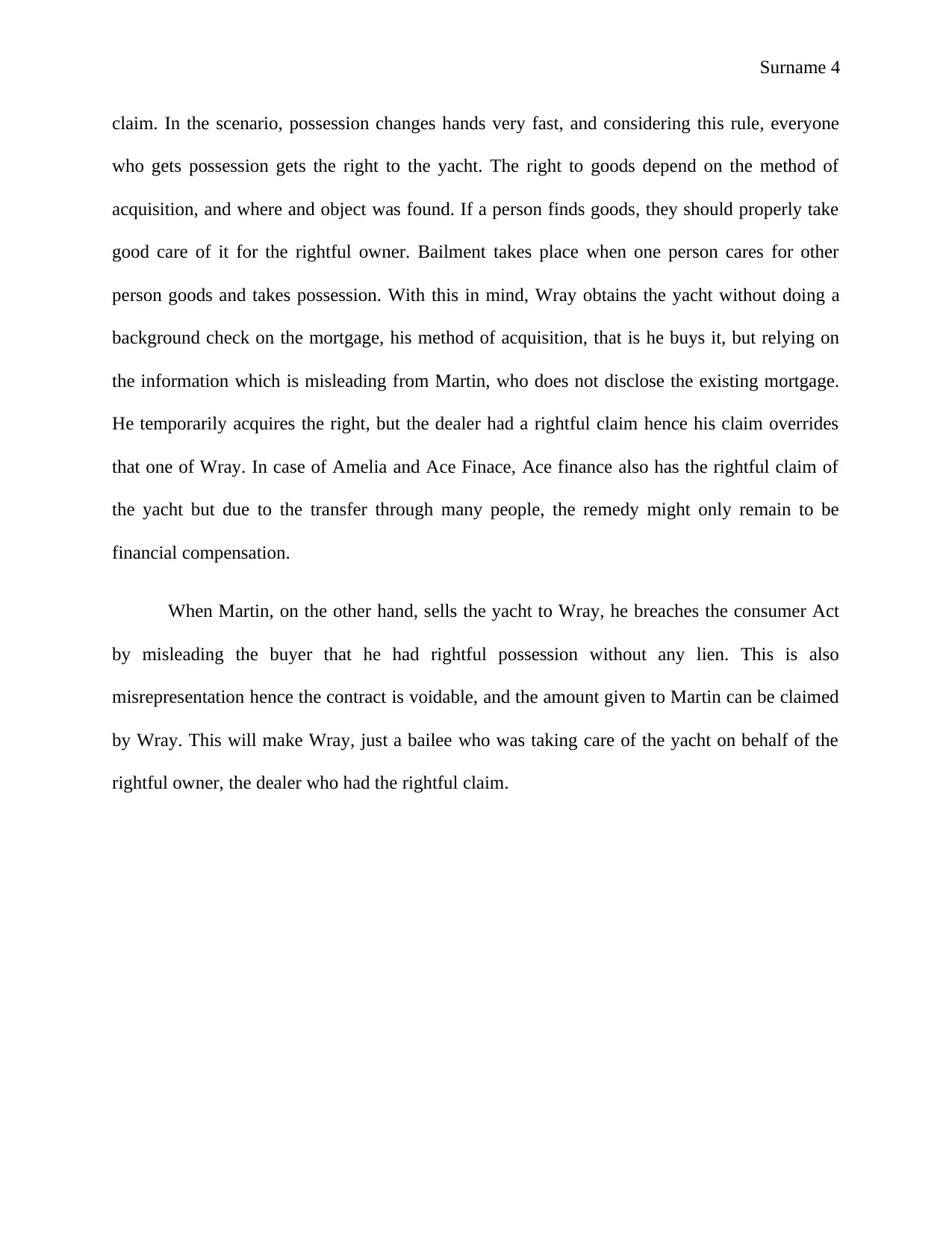Legal Analysis: Rights of Parties in a Complex Yacht Sale Scenario
VerifiedAdded on 2023/06/12
|4
|1293
|109
Case Study
AI Summary
This case study analyzes a complex scenario involving the sale of a yacht in British Columbia, Canada, and the various legal rights of the parties involved. Amelia, the original owner, sells a yacht subject to an unregistered chattel mortgage to Donald. Donald then trades the yacht to a dealer, who sells it to Martin under a conditional sale agreement, which is registered. Martin then sells the yacht to Wray, who is unaware of the existing security interest. When Martin defaults, the dealer seeks to reclaim the yacht from Wray. The analysis considers the Sale of Goods Act, the Personal Property Security Act, and consumer protection laws to determine the rights of Ace Finance (the original mortgagee), the dealer, Martin, and Wray. It concludes that the dealer likely has the strongest claim due to the registered security interest, while Wray may have a claim against Martin for misrepresentation. The study highlights the importance of due diligence in property transactions and the complexities of secured transactions involving personal property.

Surname 1
Name
Instructor’s name
Course
Date
Facts
Amelia resided in B.C and owned a yacht subject to a registered chattel mortgage of
$20,000. She sells the yacht to her friend Donald who lives in Vancouver B.C at $50,000. Later
Donald purchased a larger yacht and used the smaller yacht to cover in for part of the purchase
price. When the dealer made a search on security interest under the Personal Property Security
Act, the dealer found no interests against the yacht. The boat was later sold to Martin under a
sale agreement for $55,000 and registered security interest. Martin later sold the Yacht to Wray
for $50,000 and moved to Alberta. At the time Wray did not search for claims and paid money
without being aware that the boast had interest. The conditional sale agreement went into default
when Martin did not pay the boat dealer as agreed. The ownership of the boat was traced to
Wray, and the boat was seized by the boat dealer.
The issue in this scenario is what are the rights of the parties involved?
Rule
The Sale of Goods Act applies to future or immediate sales of goods or transfer of title.
According to the Act, goods are any tangible and movable property. Mortgages are a way of
Name
Instructor’s name
Course
Date
Facts
Amelia resided in B.C and owned a yacht subject to a registered chattel mortgage of
$20,000. She sells the yacht to her friend Donald who lives in Vancouver B.C at $50,000. Later
Donald purchased a larger yacht and used the smaller yacht to cover in for part of the purchase
price. When the dealer made a search on security interest under the Personal Property Security
Act, the dealer found no interests against the yacht. The boat was later sold to Martin under a
sale agreement for $55,000 and registered security interest. Martin later sold the Yacht to Wray
for $50,000 and moved to Alberta. At the time Wray did not search for claims and paid money
without being aware that the boast had interest. The conditional sale agreement went into default
when Martin did not pay the boat dealer as agreed. The ownership of the boat was traced to
Wray, and the boat was seized by the boat dealer.
The issue in this scenario is what are the rights of the parties involved?
Rule
The Sale of Goods Act applies to future or immediate sales of goods or transfer of title.
According to the Act, goods are any tangible and movable property. Mortgages are a way of
Paraphrase This Document
Need a fresh take? Get an instant paraphrase of this document with our AI Paraphraser

Surname 2
financing how a property is purchased. Purchaser remains with the property, but creditor retains
the title as security. The creditor uses the title to redeem debt by using the title and forecloses
when there is default in payment. Consumer Protection Act prohibits deceptive and misleading
practices. When a person makes a false statement on conditions of a contract, they can be sued
for breach. Contracts which will be performed in future should be in writing.
Rights of the parties
Secured transactions, gives the creditor first claim and that security provided can be of
equal or greater value. In the scenario both Ace Finance and the dealer have the first claim right.
Real or personal property can be used in securing transactions. Personal property includes
tangible goods or chattels and intangible claims to rights such as shares. In such cases of
security, the creditor owns claim to the property even if the debtor owns the title. Also, Ace
finance and the dealer have the claim to the yacht even if Amelia and Martin had the titles
respectively. Therefore, even if Amelia and Martin own the title, transfers can be revocable on
basis of registered mortgage. Ace Finance are not said to register the mortgage or assert their
right on the yacht. The dealer who places a claim is entitled to the yacht, Wray does not acquire
title to the property because the method of acquisition was not transparent and he did not know
of an existing mortgage. Personal Property Securities Act controls secured transactions involving
personal property. The Act allows any personal property to be used. It provides that a contract
has to be used to secure the transactions. The dealer enters into a conditional contract with
Martin to secure their transaction. The Act also provides that the title remains with the borrower
while the creditor retains the rights. The contract specifies the property to be used as an asset and
the value given to the creditor to secure. A creditor should take a step to register the security; in
the scenario, Ace Company does not register the mortgage, but the dealer registers the mortgage.
financing how a property is purchased. Purchaser remains with the property, but creditor retains
the title as security. The creditor uses the title to redeem debt by using the title and forecloses
when there is default in payment. Consumer Protection Act prohibits deceptive and misleading
practices. When a person makes a false statement on conditions of a contract, they can be sued
for breach. Contracts which will be performed in future should be in writing.
Rights of the parties
Secured transactions, gives the creditor first claim and that security provided can be of
equal or greater value. In the scenario both Ace Finance and the dealer have the first claim right.
Real or personal property can be used in securing transactions. Personal property includes
tangible goods or chattels and intangible claims to rights such as shares. In such cases of
security, the creditor owns claim to the property even if the debtor owns the title. Also, Ace
finance and the dealer have the claim to the yacht even if Amelia and Martin had the titles
respectively. Therefore, even if Amelia and Martin own the title, transfers can be revocable on
basis of registered mortgage. Ace Finance are not said to register the mortgage or assert their
right on the yacht. The dealer who places a claim is entitled to the yacht, Wray does not acquire
title to the property because the method of acquisition was not transparent and he did not know
of an existing mortgage. Personal Property Securities Act controls secured transactions involving
personal property. The Act allows any personal property to be used. It provides that a contract
has to be used to secure the transactions. The dealer enters into a conditional contract with
Martin to secure their transaction. The Act also provides that the title remains with the borrower
while the creditor retains the rights. The contract specifies the property to be used as an asset and
the value given to the creditor to secure. A creditor should take a step to register the security; in
the scenario, Ace Company does not register the mortgage, but the dealer registers the mortgage.

Surname 3
Therefore, if both were to go to court, the dealer stands a better chance in proving that he has the
rightful claim to the yacht. If the debtor defaults, the creditor can claim property without going to
court without using any force or violence. Court order is not necessarily required if a property is
accessible. To recover debt goods can be resold, and the debtor should be notified so that if they
have the option to redeem goods if possible.
In the scenario above, we see Amelia having ownership of a yacht; however, the yacht is
subject to the unregistered mortgage of $20,000. Mortgages are used to finance a property, while
the purchaser retains the ownership, the creditor retains claim to the property when there is a
default. In this case, Ace Finance has the right to claim the yacht upon default however it might
be difficult to prove the mortgage since it is unregistered. Amelia sells the yacht to Donald, who
acquires the right to the yacht as he pays for the consideration of $50,000.
Donald then sells to a dealer who performs his due diligence and finds out that the yacht
is not registered for any mortgage. The dealer performs his due diligence, and he buys the yacht
in good faith. He, therefore, acquires the right to the yacht both possessions and title. When the
dealer makes a sale agreement which on default reverts to him upon non-payment, he still retains
the possession of the yacht when Martin does not pay the full mortgage as stipulated in the
contract. He obtains the right to lien without any further notice. The courts may not be able to
enforce his contract since the yacht is Already in Alberta, and the rules of B.C apply to the
scenario. Since the dealer already seized the boat, he has the rightful possession.
Property is a person's right to something, not necessarily the thing itself. Personal
property includes chattels and tangible movable items; in this scenario the yacht. When someone
has possession of goods, it gives them right over everyone except to someone who had the prior
Therefore, if both were to go to court, the dealer stands a better chance in proving that he has the
rightful claim to the yacht. If the debtor defaults, the creditor can claim property without going to
court without using any force or violence. Court order is not necessarily required if a property is
accessible. To recover debt goods can be resold, and the debtor should be notified so that if they
have the option to redeem goods if possible.
In the scenario above, we see Amelia having ownership of a yacht; however, the yacht is
subject to the unregistered mortgage of $20,000. Mortgages are used to finance a property, while
the purchaser retains the ownership, the creditor retains claim to the property when there is a
default. In this case, Ace Finance has the right to claim the yacht upon default however it might
be difficult to prove the mortgage since it is unregistered. Amelia sells the yacht to Donald, who
acquires the right to the yacht as he pays for the consideration of $50,000.
Donald then sells to a dealer who performs his due diligence and finds out that the yacht
is not registered for any mortgage. The dealer performs his due diligence, and he buys the yacht
in good faith. He, therefore, acquires the right to the yacht both possessions and title. When the
dealer makes a sale agreement which on default reverts to him upon non-payment, he still retains
the possession of the yacht when Martin does not pay the full mortgage as stipulated in the
contract. He obtains the right to lien without any further notice. The courts may not be able to
enforce his contract since the yacht is Already in Alberta, and the rules of B.C apply to the
scenario. Since the dealer already seized the boat, he has the rightful possession.
Property is a person's right to something, not necessarily the thing itself. Personal
property includes chattels and tangible movable items; in this scenario the yacht. When someone
has possession of goods, it gives them right over everyone except to someone who had the prior
⊘ This is a preview!⊘
Do you want full access?
Subscribe today to unlock all pages.

Trusted by 1+ million students worldwide

Surname 4
claim. In the scenario, possession changes hands very fast, and considering this rule, everyone
who gets possession gets the right to the yacht. The right to goods depend on the method of
acquisition, and where and object was found. If a person finds goods, they should properly take
good care of it for the rightful owner. Bailment takes place when one person cares for other
person goods and takes possession. With this in mind, Wray obtains the yacht without doing a
background check on the mortgage, his method of acquisition, that is he buys it, but relying on
the information which is misleading from Martin, who does not disclose the existing mortgage.
He temporarily acquires the right, but the dealer had a rightful claim hence his claim overrides
that one of Wray. In case of Amelia and Ace Finace, Ace finance also has the rightful claim of
the yacht but due to the transfer through many people, the remedy might only remain to be
financial compensation.
When Martin, on the other hand, sells the yacht to Wray, he breaches the consumer Act
by misleading the buyer that he had rightful possession without any lien. This is also
misrepresentation hence the contract is voidable, and the amount given to Martin can be claimed
by Wray. This will make Wray, just a bailee who was taking care of the yacht on behalf of the
rightful owner, the dealer who had the rightful claim.
claim. In the scenario, possession changes hands very fast, and considering this rule, everyone
who gets possession gets the right to the yacht. The right to goods depend on the method of
acquisition, and where and object was found. If a person finds goods, they should properly take
good care of it for the rightful owner. Bailment takes place when one person cares for other
person goods and takes possession. With this in mind, Wray obtains the yacht without doing a
background check on the mortgage, his method of acquisition, that is he buys it, but relying on
the information which is misleading from Martin, who does not disclose the existing mortgage.
He temporarily acquires the right, but the dealer had a rightful claim hence his claim overrides
that one of Wray. In case of Amelia and Ace Finace, Ace finance also has the rightful claim of
the yacht but due to the transfer through many people, the remedy might only remain to be
financial compensation.
When Martin, on the other hand, sells the yacht to Wray, he breaches the consumer Act
by misleading the buyer that he had rightful possession without any lien. This is also
misrepresentation hence the contract is voidable, and the amount given to Martin can be claimed
by Wray. This will make Wray, just a bailee who was taking care of the yacht on behalf of the
rightful owner, the dealer who had the rightful claim.
1 out of 4
Your All-in-One AI-Powered Toolkit for Academic Success.
+13062052269
info@desklib.com
Available 24*7 on WhatsApp / Email
![[object Object]](/_next/static/media/star-bottom.7253800d.svg)
Unlock your academic potential
Copyright © 2020–2025 A2Z Services. All Rights Reserved. Developed and managed by ZUCOL.
